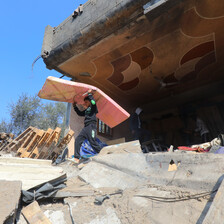The Electronic Intifada 5 April 2024

The scene following an Israeli attack on Rafah.
APA imagesMustafa and his family have been uprooted many times over the past six months.
The first displacement occurred when Israel bombarded al-Rimal, a neighborhood of Gaza City. The family’s home was destroyed as a result.
The family went to stay with relatives in Jabaliya refugee camp. Their relatives’ home was also attacked.
The family then took shelter at a school run by the UN agency for Palestine refugees (UNRWA). It, too, came under fire.
The family were having one meal per day at most in the north. As time went on, they could not find any food at all.
Mustafa did not want to leave the northern part of Gaza. “But starvation forced us to,” he said.
And so the family headed to Deir al-Balah in central Gaza. The house in which they found shelter there was attacked by Israel within a few weeks of their arrival.
Now, the family are in Rafah, Gaza’s southernmost city. They are staying in a relatives’ home.
Mustafa is deeply worried by Israel’s repeated threats to conduct a major ground offensive in Rafah.
If such an offensive occurred, he doesn’t know where the family could live.
“I think we would have to go to our graves,” he said. “We would have no other choice.”
“Catastrophic”
Hamza similarly had to leave Gaza City. He and his family moved to Khan Younis, southern Gaza, during the all-too-brief truce at the end of November.
The family were staying in a tent near Nasser Medical Complex, when Israel ordered the evacuation of the area in January. The hospital is one of many to have been besieged by Israel.
Following the evacuation order, the family walked to Rafah. They are among the vast numbers of people now living in tents.
“The situation is catastrophic in Rafah,” Hamza said. “There are vegetables in the markets but their prices have hit the roof. So we can only eat canned food, which doesn’t give us the nutrition we need.”
“We have already lost several kilos in weight,” he added. “I wonder how much more we will lose when Israel undertakes a ground invasion and leaves us with little access to food and water. We could die from starvation.”
Suhair is a mother of three.
She has paid tens of thousands of dollars to a company arranging travel for people from Gaza. A large portion of the money is used to bribe Egyptian officials.
The money had been earned from her work in digital marketing. “I have spent most of my savings so that my children and I can survive,” she said.
She is now waiting to see her family appear on a list of people permitted to leave Rafah and enter Egypt. It can take a month between handing over money for a bribe and being granted the required authorization for travel.
Suhair does not know what she would do if Israel launches a major ground offensive in Rafah before her family is allowed to travel.
A major offensive against Rafah would result in the same type of wholesale destruction that Israel has inflicted on other areas, Suhair predicts.
“We will die if we stay in Gaza,” she said. “There will be massacres and starvation everywhere.”
Salma Yaseen is a student of English literature at the Islamic University of Gaza.





